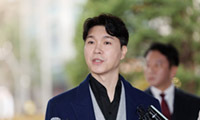For Urban Gay Arabs, A Unique Melting Pot
When the strobe lights flashed, they revealed a sea of raised hands. “I can understand so many conversations going on right now,” a Fashion Institute of Technology student shouted over the music, shaking his hips to the belly-dance beat. “But you wouldn’t want me to translate. It’s all dirty. Dirty Arabic.”
This was a recent Saturday night at Habibi, a floating monthly dance party of lesbian, gay, bisexual and transgender Arabs in New York.
In a city that seems to offer activities for every conceivable gay subculture, Habibi is perhaps the only opportunity in New York for gay people of Middle Eastern descent to interact openly in an organized setting.
“In New York there’s nowhere I can come to and cry, so to speak,” said Amir, 27, a nurse from Saudi Arabia who lives in Brooklyn. “Habibi is a welcoming community.”
Lately, Habibi, now in its nomadic ninth year, has made its home at Club Rush in the Chelsea neighborhood. Its founder, Abraham, spins the tunes as the mob dances to Middle Eastern pop.
Habibi, the Arabic word for my beloved, is a sort of stepchild of a more serious-minded group called the Gay and Lesbian Arab Society. Abraham, a former accountant in his 40s with a shaved head and smoky accent, was one of the society’s cofounders.
“It got big, which is not always a good thing, because you have all nationalities of the Middle East,” said Abraham, who is of Syrian and Palestinian descent, grew up in Kuwait and now lives in the Queens neighborhood. Like others interviewed for this article, he spoke on the condition that his last name not be used.
“The Egyptians want to hang out with the Egyptians, the Moroccans want to hang out with the Moroccans, et cetera. This is always a problem you have with Arabs,” he said.
“Habibi blends everybody. It breaks down as many walls as possible. You have everyone in the same room dancing.”
The society’s ranks, meanwhile, continued to thin. “I think around 2004, it was the Internet that really did it,” said Nadeem, an Iraqi Christian who served as the society’s president from 2000 to 2004, when it stopped meeting (its Web site remains active). “Habibi is so successful, one, because it’s a business and Abraham really treats it like one, and two, the idea of a party entices people more.”
Gay Muslims, at least as much as adherents of other faiths, face hurdles reconciling their religion with their sexuality. At the city’s biggest mosque and one of its most progressive, the Islamic Cultural Center of New York, the imam, Mohammad Shamsi Ali, laid out what amounted to a “don’t ask, don’t tell” policy.
He said gays and lesbians were welcome at his mosque . “But we don’t need to know about their sex lives,” he said.
Habibi, which has attracted as many as 300 guests, brings together Arabs of all social levels - at once a blessing and a source of its own discrimination.
“In Dubai, everyone is bisexual,” a 22-year-old Columbia University accounting student said at a recent party. Calling Habibi “kind of trashy compared to what most Arabs, at least in Dubai, are used to,” he said: “I mean, there are street vendors here.”
In the D.J.’s booth, Abraham kept the hits coming - mainly from Egypt and Lebanon, but also some South Asian and Indian pop. “Anything with a belly-dance beat,” he said. The dancers included plenty of non-Arab men.
“Hummus queens,” a 24-year-old grocery clerk from Queens named Hilal joked at one of the parties. “That’s what you call white guys who go for Arabs.”
Some of the guests yearned for something more than just a good time. “There’s a lot of post-9/11 baggage that people want to deal with,” Hilal said . “But the only option they have is to go out to a club and dance?”
Still, Hilal took his place on the dance floor, too.
And around 1 a.m., three female belly dancers took to the stage, dressed in pink sequined burqas. The crowd cheered as the women, piece by piece, stripped their burqas.
By CHADWICK MOORE
스마터리빙
more [ 건강]
[ 건강]이제 혈관 건강도 챙기자!
[현대해운]우리 눈에 보이지 않기 때문에 혈관 건강을 챙기는 것은 결코 쉽지 않은데요. 여러분은 혈관 건강을 유지하기 위해 어떤 노력을 하시나요?
 [ 건강]
[ 건강]내 몸이 건강해지는 과일궁합
 [ 라이프]
[ 라이프]벌레야 물럿거라! 천연 해충제 만들기
 [ 건강]
[ 건강]혈압 낮추는데 좋은 식품
[현대해운]혈관 건강은 주로 노화가 진행되면서 지켜야 할 문제라고 인식되어 왔습니다. 최근 생활 패턴과 식생활의 변화로 혈관의 노화 진행이 빨라지고
사람·사람들
more많이 본 기사
- [특파원시선] 외식비 줄이는 미국… ‘30% 요구’ 팁 공포도 한몫?
- 인도 투어 나선 축구스타 메시…경기장 조기 퇴장에 팬들 난동
- 정용진 신세계그룹 회장, 밴스 부통령 성탄절 만찬 참석
- 10석 안팎까지?…내년 한국 지방선거 때 ‘미니 총선급’ 재보선 가능성
- 오세훈 “내집 마련 꿈, 10·15대책에 짓밟혀…규제 완화해야”
- 아이비리그 브라운대서 총격…최소 2명 사망, 8명 중상
- 뉴욕 백화점서 아기 기저귀 갈던 엄마, 정신질환자에 흉기피습
- 1124일만 선고.. ‘20억 횡령 인정’ 박수홍 친형 결론은?
- 변요한♥티파니, 약지에 ‘커플링·포르쉐’..열애 中 티냈다
- 조미김, 미국 수출관세 ‘면제’됐다…K-김 최대시장서 날개
- ‘김민재 점점 독일 국대에 밀린다’ 독일 현지, 타 향해 연일 찬사... “뮌헨 최고의 영입, 진정한 수비 리더”
- 연말연시 과음 후 속쓰림…단순숙취? “급성염증 신호일수도”
- 한소희, 韓 떠나기 전 의미심장 SN… 1
- 지선 손 맞잡을까…통일교 특검으로 거리 좁히는 국힘·개혁신당
- 트럼프, 시리아서 IS 공격으로 美병사 사망하자 “강력 보복”
- 김연아♥고우림, 사랑하니 닮아가네..예쁜 커플사진
- AI 시장 흔들렸다…챗GPT 독주 속 제미나이 급부상
- TV 나와 암투병 근황 공개한 찰스 英국왕… “조기검진 중요해요”
- ‘아프리카에 당한 기억’ 홍명보, ‘1승 제물’ 남아공 경계했다... 박문성도 “2014 월드컵 악몽 떠올라”
- ‘인니 수마트라섬 대홍수’ 사망자 1천명 넘어…218명 실종
- 與, 은행법 처리뒤 ‘경찰관직무집행법’ 상정…국힘 또 필버
- “다카이치 ‘대만발언’은 對中전략 부재 탓…정상 만나야 해결”
- 韓 탁구 최초 역사… 신유빈-임종훈, 세계랭킹 1위+파리올림픽 金 듀오 꺾고 WTT 파이널스 우승
- 트럼프 “인디애나 선거구 조정 반대한 공화의원들, 교체돼야”
- 美, 카리브해 군사자산 확대… “베네수엘라에 지상·전자전 위협”
- 트럼프 “인디애나 선거구 조정 반대한 공화의원들, 교체돼야”
- 트럼프 “태국·캄, 교전 중단 합의”… 1
- ‘트럼프 골드카드’신청 시작, 100만달러 내면 미 영주권
- 국방부 “시리아서 공격받아 미군 2명 사망…공격범 사살”
- ‘손흥민 벽화 3일 만에 그린’ 예술가, SON과 감격 만남 후 “내 아들의 영웅이자 아시아 유산” 찬사
- 시리아서 미군 피격, 3명 사망… “시리아군 내 극단주의자 소행”
- MD한인회장 또‘무후보’
- 이정후 태극마크 ‘청신호’ 떴다! 스타 출신 SF 사장 “야수보단 투수가 WBC 위험”→걸림돌 사라졌다
- 내란특검, 김용현 추가 기소… “HID요원 등 명단 노상원에 넘겨”
- 굽히지 않는 젤렌스키…트럼프에 역제안 카드로 레드라인 저지
- 한국 교사 10명, 페어팩스 초등교 배치
- 종묘 일대 세계유산지구로 세운4구역 개발 영향 줄까
- “한국, 재래식 방위주도” 한미 핵협의그룹 첫 명시
- 한화, 호주 방산업체 최대주주 된다
- 뉴욕증시, 브로드컴 비관론에 AI 테마 ‘와르르’…나스닥 1.7%↓ 마감
- 소셜연금 NY 2,018달러·NJ 2,190달러
- 변요한♥티파니, 결혼 전제 열애 인정
- 한국도 참여한 美주도 AI 동맹 “비… 1
- 김찬수씨, 포토맥 포럼에 2천달러 기부
- 국힘·개혁신당 “통일교 특검 수용하라”…與 “정치공세·물타기”
- “귀금속 역사상 가장 극적인 재평가”…올해는 銀이 金 앞섰다 [공준호의 탈월급 생존법]
- 선교사 아들 가나대사로 금의환향… “… 1
- “엔비디아, 中수요 반영 H200 증산”…일각선 “中, 수입거부할듯”
- 워싱턴주 홍수로 수만명 대피…주지사 “유례없는 상황 직면”
- <부음> 이명무 전 SF 체육회장 부인상
1/5지식톡

-
 테슬라 자동차 시트커버 장착
0
테슬라 자동차 시트커버 장착
0테슬라 시트커버, 사놓고 아직 못 씌우셨죠?장착이 생각보다 쉽지 않습니다.20년 경력 전문가에게 맡기세요 — 깔끔하고 딱 맞게 장착해드립니다!장착비용:앞좌석: $40뒷좌석: $60앞·뒷좌석 …
-
 식당용 부탄가스
0
식당용 부탄가스
0식당용 부탄가스 홀세일 합니다 로스앤젤레스 다운타운 픽업 가능 안녕 하세요?강아지 & 고양이 모든 애완동물 / 반려동물 식품 & 모든 애완동물/반려동물 관련 제품들 전문적으로 홀세일/취급하는 회사 입니다 100% …
-
 ACSL 국제 컴퓨터 과학 대회, …
0
ACSL 국제 컴퓨터 과학 대회, …
0웹사이트 : www.eduspot.co.kr 카카오톡 상담하기 : https://pf.kakao.com/_BEQWxb블로그 : https://blog.naver.com/eduspotmain안녕하세요, 에듀스팟입니다…
-
 바디프렌드 안마의자 창고 리퍼브 세…
0
바디프렌드 안마의자 창고 리퍼브 세…
0거의 새제품급 리퍼브 안마의자 대방출 한다고 합니다!8월 23일(토)…24일(일) 단 이틀!특가 판매가Famille: $500 ~ $1,000Falcon: $1,500 ~ $2,500픽업 & 배송직접 픽업 가능LA…
-
 바디프렌드 안마의자 창고 리퍼브 세…
0
바디프렌드 안마의자 창고 리퍼브 세…
0거의 새제품급 리퍼브 안마의자 대방출 한다고 합니다!8월 23일(토)…24일(일) 단 이틀!특가 판매가Famille: $500 ~ $1,000Falcon: $1,500 ~ $2,500픽업 & 배송직접 픽업 가능LA…
케이타운 1번가
오피니언

22기 LA평통 출범에 거는 기대

연말 시즌 사기·범죄 경계해야
 메건 매카들 워싱턴포스트 칼럼니스트
메건 매카들 워싱턴포스트 칼럼니스트 [메건 매카들 칼럼] 장편영화의 마지막 챕터인가
 김미선 서북미문인협회 회장시인
김미선 서북미문인협회 회장시인 [한국춘추] 하늘을 계산한 사람들, 칠정산
 이희숙 시인·수필가
이희숙 시인·수필가 [금요단상] 그을린 자리에서 다시
 심상용 / 서울대 미술관장
심상용 / 서울대 미술관장 [미술 다시보기] 지옥에 대하여
 서정명 / 서울경제 기자
서정명 / 서울경제 기자[만화경] 주한미군과 ‘도련선 리스크’
 한 영 재미수필가협회 회장
한 영 재미수필가협회 회장 [한영의 독서칼럼] 불안한 사람들
 정영현 서울경제 테크성장부장
정영현 서울경제 테크성장부장 [여명] 콘크리트가 데이터가 됐을 뿐, 달라진 게 없다
1/3지사별 뉴스

“마약밀매·인신매매 등 국제범죄 척결” ‘국토안보 태스크포스’ 뉴욕지부 출범
연방 국토안보부가 10일 ‘국토안보 태스크포스’(HSTF) 뉴욕지부를 출범시켰다.HSTF는 마약 카르텔, 인신매매, 자금세탁, 갱단 등 국제범…
‘오바마케어 보조금’ 올해 말 종료 가능성 ↑ 커져

한국 교사 10명, 페어팩스 초등교 배치
‘글로벌 앰버서더 티처스 프로그램’(Global Ambassador Teachers Program)은 국제 교사 교환 프로그램 가운데 하나로 …
김찬수씨, 포토맥 포럼에 2천달러 기부

트럼프 “인디애나 선거구 조정 반대한 공화의원들, 교체돼야”
도널드 트럼프 대통령은 13일 연방 하원의원 선거구 조정 표결에서 반대표를 던진 인디애나주 공화당 주(州) 상원의원들을 비판하며 당내 예비선거…
<부음> 이명무 전 SF 체육회장 부인상

오늘 하루 이 창 열지 않음 닫기 





















































.png)


댓글 안에 당신의 성숙함도 담아 주세요.
'오늘의 한마디'는 기사에 대하여 자신의 생각을 말하고 남의 생각을 들으며 서로 다양한 의견을 나누는 공간입니다. 그러나 간혹 불건전한 내용을 올리시는 분들이 계셔서 건전한 인터넷문화 정착을 위해 아래와 같은 운영원칙을 적용합니다.
자체 모니터링을 통해 아래에 해당하는 내용이 포함된 댓글이 발견되면 예고없이 삭제 조치를 하겠습니다.
불건전한 댓글을 올리거나, 이름에 비속어 및 상대방의 불쾌감을 주는 단어를 사용, 유명인 또는 특정 일반인을 사칭하는 경우 이용에 대한 차단 제재를 받을 수 있습니다. 차단될 경우, 일주일간 댓글을 달수 없게 됩니다.
명예훼손, 개인정보 유출, 욕설 등 법률에 위반되는 댓글은 관계 법령에 의거 민형사상 처벌을 받을 수 있으니 이용에 주의를 부탁드립니다.
Close
x